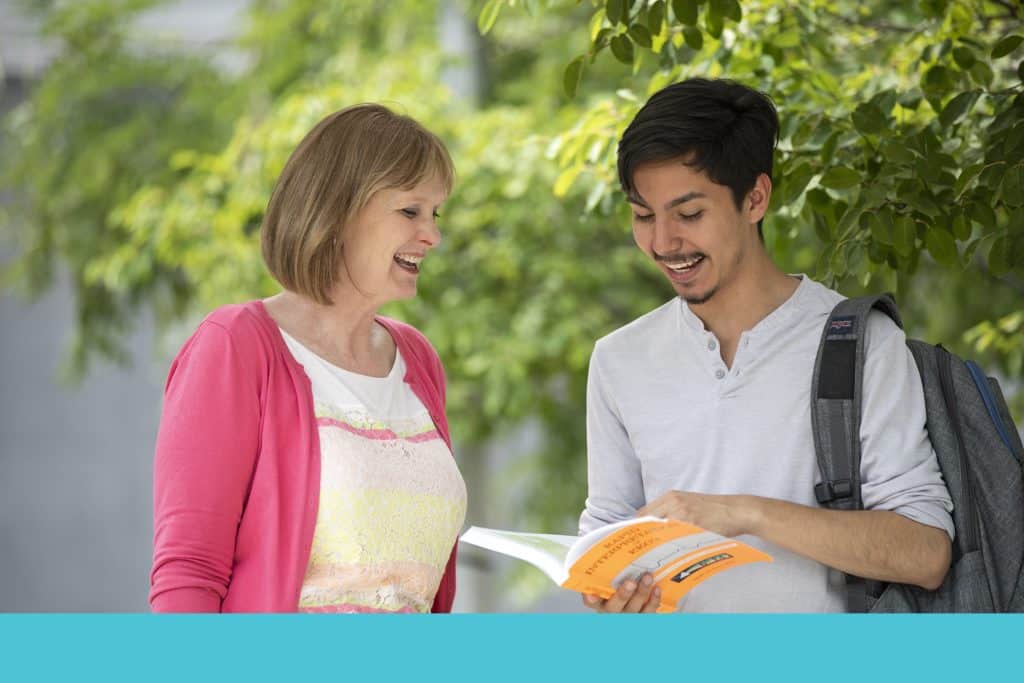August 8, 2019
Cherie Burke, PhD(c), DNP, CRNA, APN, has been a nurse anesthetist and teacher for three decades — but she’s seeing her job through a whole new lens these days. As one of the first cohort of 26 mentors in Rush’s new REACH MedSTEM Pathways mentorship program, Burke spent six weeks this summer mentoring Eugene Urbina, a 2019 graduate of Richard T. Crane Medical Preparatory High School.
“I’ve found that being a mentor has given me zest for what I do again,” she says. “When you’re introducing your job to someone who gets really excited about it, you see it through their eyes. I remember feeling that way! The energy is contagious.”
Urbina has been part of REACH and its predecessor programs through the SAME Network since he was a fifth-grader, so he’s had a lot of experience at Rush — including his current internship in the neurosurgical ICU — but this summer was extra valuable thanks to Burke, he says. “When you’re in a classroom or a department during an internship, you’re learning or working. But building a one-on-one relationship with a mentor gives you space to ask for advice on professional and personal issues. That’s where I see the biggest benefit.”
And if you look at a photo of REACH students, Urbina adds, “you’ll see a lot of different colors and shades, and many of us come from low-income families. No one in my family is a doctor or a nurse or a nurse anesthetist; they’re laborers or construction workers or in administrative jobs. When that’s all you see in your home life, it can be hard to imagine yourself working other places.
“I have a lot of admiration for my family, but such big dreams for myself. Having Cherie as my mentor has helped to show me what I can do.”
Alongside Burke, Urbina has explored a virtual cadaver and learned to intubate a mannequin in the Center for Clinical Skills and Simulation; before the summer ends, he hopes to observe a surgery in which she’s involved.
Giving Back and Opening Doors
The rewards for mentors are disproportionate compared to the time commitment that’s required, according to Burke: “I know it’s a cliché, but I get so much more out of it than I give.” Mentors attend a training session, then commit to meeting with their mentee three times in person and touching base weekly by email or phone. It all adds up to a total of 12 to 16 hours over the program’s six weeks.
“The mentor training is fun, and another benefit for me was meeting other mentors with whom I would never have crossed paths,” Burke says, “so it’s helping me build my Rush network, too.” If they want it, mentors receive a lot of support from the REACH team during the program, she adds, but in her experience the mentees are so motivated and enthusiastic that there’s no extra help needed.
REACH programs are active year-round, and the team is always looking for Rush students, faculty and staff to be part of career panels, give tours, host job shadows and speak to classes. “I really urge people to give it a try: Be on a panel or do a lunch and learn during the school year, and sign up to help during the summers,” Burke says.
Urbina has a word for potential mentors, too: “Imagine being young again and having no idea about what you want to do later on — and then think about how you can help someone gain direction, along with meaning and excitement and joy about working in a field you really care about.”
The MedSTEM Pathways mentoring program wrapped up for the year on Aug. 2, but Burke and Urbina plan to stay in touch after he leaves for the University of Illinois at Champaign-Urbana, where he expects to double major in pre-med and linguistics or philosophy. “I see his drive and commitment and work ethic and know that he can be whatever he wants to be,” Burke says.

